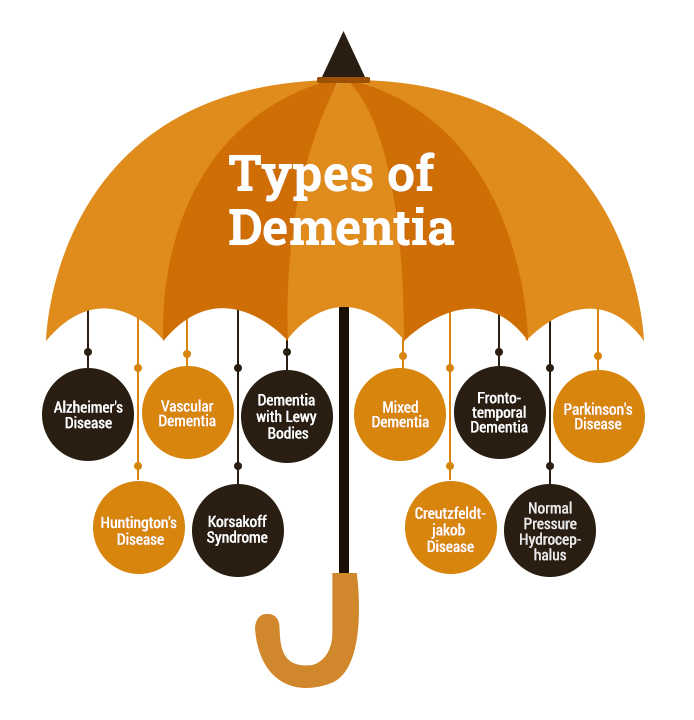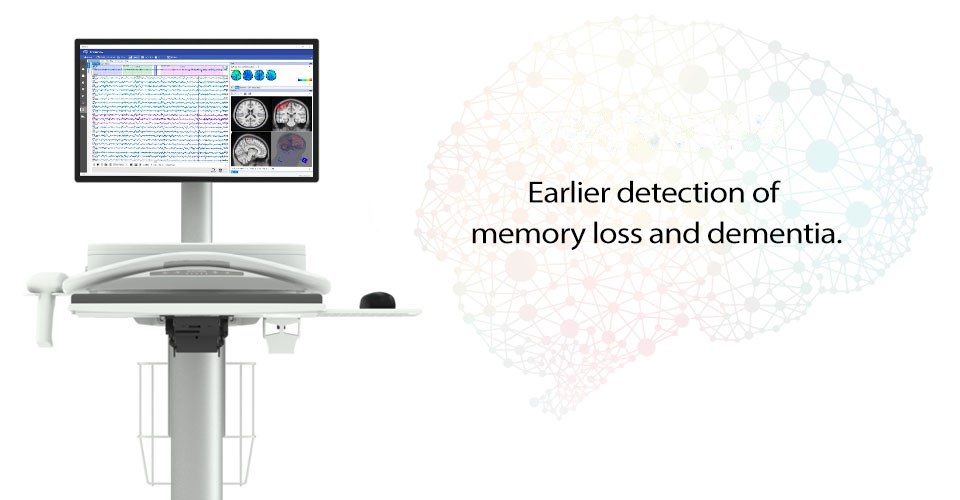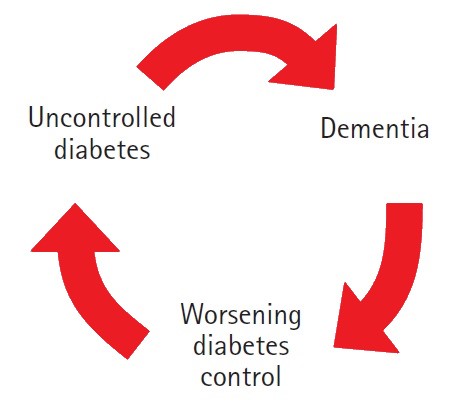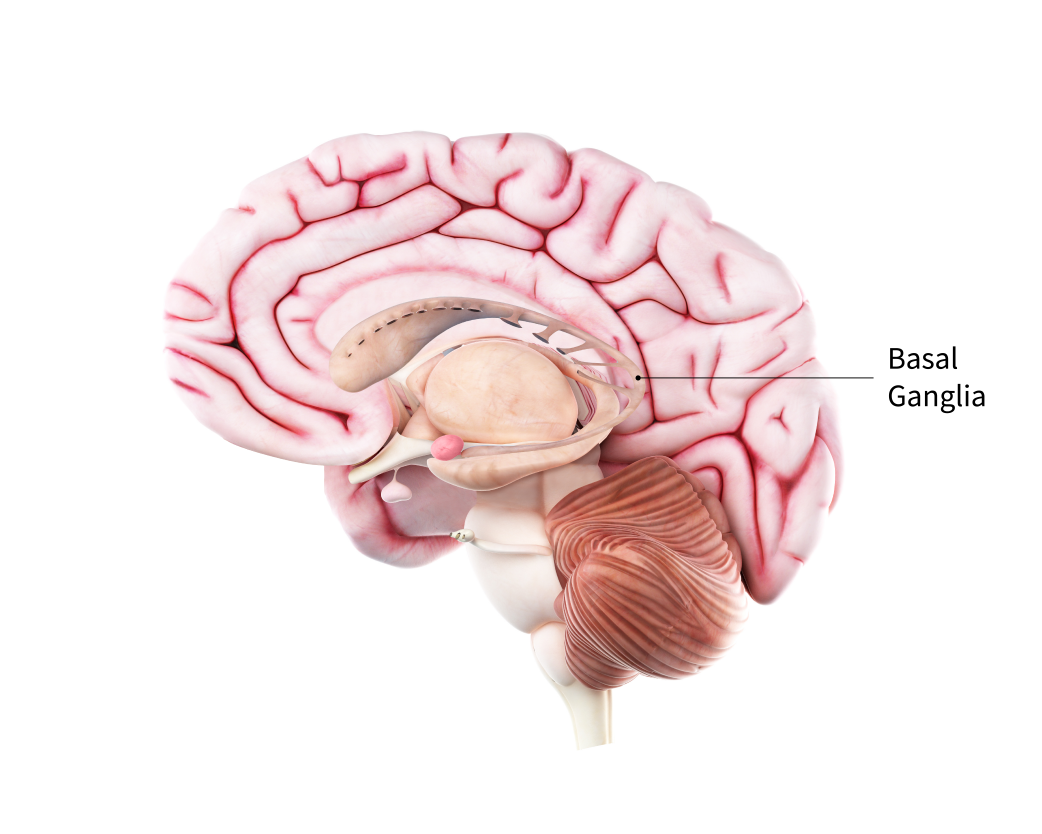Dementia
Dementia is not a specific disease. It is an umbrella term for a decline in memory and thinking ability severe enough to hinder daily activities. There are many different types of dementia. It’s a broad term that describes a wide range of symptoms associated with a decline in memory or other thinking skills severe enough to reduce a person’s ability to perform everyday activities. Alzheimer’s disease accounts for 60 to 80 percent of cases. Vascular dementia, which occurs after a stroke, is the second most common dementia type. But many other conditions can cause symptoms of dementia, including some that are reversible, such as thyroid problems and vitamin deficiencies.
Memory loss and other symptoms of dementia
While symptoms of dementia can vary greatly, at least two of the following core mental functions must be significantly impaired to be considered dementia:
- Memory
- Communication and language
- Ability to focus and pay attention
- Reasoning and judgment
- Visual perception

7 Stages of Dementia

No or Little Dementia
Stage 1: Normal outward behavior. No Dementia. Quality of life: no impact
You won’t notice any changes with your loved one.
How You Can Help:
If you and your loved one are concerned about dementia, start to plan now. Use our tools to help your loved one document his or her values and priorities about the type of care wanted during the various stages of dementia. You can also watch for new signs that you may not have seen before.
Stage 2: Very mild changes. No Dementia. Quality of life: little to no impact
You still might not notice any changes in your loved one. You’ll see daily memory problems that look like a normal part of aging. You may see:
- Some difficulty finding the right words.
- The ability to make up for memory problems, such as substituting one word for another.
- Normal functioning in the home, community, and workplace.
How You Can Help:
As with Stage 1, start to plan now. Use our tools to help your loved one document his or her values and priorities about the type of care wanted during the various stages of dementia.
You can also watch for new signs that you may not have seen before.
Stage 3. Mild Changes. Quality of life: very little impact
You likely will start to notice changes in your loved one’s thinking and reasoning. You also will see some memory loss. You may see your loved one:
- Show some signs of forgetfulness, such as losing an item and not being able to retrace steps to find it.
- Have some difficulty finding the right words or names.
- Take more effort to remember appointments, manage money, and manage medicines.
- Have trouble paying attention all the time.
- Begin to have problems at work.
How You Can Help:
If you haven’t already done it, help your loved one plan for when he or she might have severe dementia. Use our tools to create a document that list his or her values and priorities at different stages of dementia.
If you have, help the health care team follow your loved one’s care preferences.
You can also help with:
- Organizing appointments.
- Paying bills.
- Managing medicines, such as using a pill organizer.
- Helping to put legal and financial documents in order.
- Start to do more of the driving, if possible.
Early-Stage Dementia
Stage 4: Moderate Changes/Mild Dementia Quality of life: very little impact
Your loved one will remember all or most of his or her past and will recognize loved ones. You have the ability to make your own healthcare decisions. You may see your loved one:
- Forget familiar words and names of items.
- Forget where things were left, like their eyeglasses or phone.
- Have some trouble with daily tasks such as laundry, cooking and shopping.
- Make more mistakes with driving and feel uncomfortable in unfamiliar places.
- Have trouble Increased trouble with keeping up with finances
- Be unable to find the right words more often
- Decreased knowledge of recent events
- Increased difficulties with problem solving
How You Can Help:
If you haven’t already done it, help your loved one plan for when he or she might have severe dementia. Use our tools to create a document that lists care values and priorities at different stages of dementia.
If you have, help the health care team follow your loved one’s care preferences.
You can also:
- Take over the driving.
- Help with everyday tasks.
Mid-Stage Dementia
Stage 5: Moderately Severe Mental Decline/Moderate Dementia Quality of life: Moderate impact
Your loved one will likely remember some of their past and still recognize loved ones. He or she may have trouble making healthcare decisions. You may need some care in the home for day-to-day activities. You may see your loved one:
- Experience personality changes and mood swings.
- Repeat the same questions over and over again.
- Have gaps in memory and become confused about the date, where you are, or your address and phone number.
- Need help with eating or using the toilet.
- Have trouble choosing clothing, such as what kind of close to wear for the season.
- Have bladder problems.
How You Can Help:
If you haven’t already helped your loved one document his or her care wishes, talk with the health care team and the options for care.
If you have, help the health care team follow your loved one’s care preferences.
You can:
- Help with dressing, toileting, and other daily activities.
- Respond to repeated questions with patience.
Stage 6: Severe Mental Decline/Moderately Severe Dementia Quality of life: Severe impact
Your loved one will not remember much or any of the past and may not recognize you and other family and friends. He or she may have trouble making healthcare decisions. You may need 24-hour care in the home for day-to-day activities. You may see your loved one:
- Show strong personality changes and mood swings.
- Have delusions, such as thinking it is time to go to work when there is no job.
- Not be able to use the toilet or get dressed without help.
- Getting lost or wandering off.
- Have problems sleeping at night but sleep during the day.
- Lack of awareness of events and experiences.
- Changes in eating habits.
- Difficulty speaking.
- Have bladder problems.
How You Can Help:
Help the health care team follow your loved one’s care preferences. You can:
- Help with dressing, toileting, and other daily activities.
- Continue to try to connect with your loved one. Sometimes connecting in ways other than talking can help, such as listening to music or reading a story.
- Respond with patience.
Late-Stage Dementia
Stage 7: Very Severe Mental Decline/Severe Dementia (Final stage) Quality of life: Very severe impact
Your loved one will not remember any of the past or recognize loved ones. He or she will have likely lost the ability to make healthcare decisions. You will need 24-hour care in the home for day-to-day activities. You may see your loved one:
- Lose the ability to speak, eat or swallow.
- Not be able to use the toilet or get dressed without help.
- Not be able to walk or sit without help.
- Loss of language skills throughout this stage
- Lose all bladder and bowel control.
- Loss of muscle control
- Stop walking and may be confined to a wheelchair or bed at this time
- Often cannot recognize family members
- Almost always disoriented
How You Can Help:
Help the health care team follow your loved one’s care preferences. You can:
- Help with dressing, toileting, and other daily activities.
- Continue to try to connect with your loved one. Sometimes connecting in ways other than talking can help, such as listening to music or reading a story.
- Respond with patience.
If you think you or a loved one may be showing signs of dementia, talk to your doctor. The sooner the disease is diagnosed, the sooner treatment can start.
What We Can Do to Prevent Dementia
We identify:
- Cognitive function and impairment
- Biomarkers associated with cognitive impairment and memory loss
- Autonomic nervous system function
- Physiologic functions associated with sleep disorders, memory loss, anxiety disorders and attention difficulties
To Assess:
- The degree of cognitive impairment
- Physiologic changes in cognitive function over time
- Cognitive function response to clinical therapies

Dementia Prevention
1. Sleep well
2. Exercise well
3. Eat well
4. No unhealthy habits like smoking
5. Learn new things to create more meaningful neuronal connections for neuroplasticity, as a form of mental exercise
Is There A Link Between diabetes & Dementia
According to researchers, there is a link between diabetes and dementia. People with type 2 diabetes are more likely to experience cognitive impairment, including Alzheimer’s disease and vascular dementia.
Cognitive impairment refers to various issues, such as trouble concentrating, learning new things, remembering information, and making decisions.
In 2021, a group of researchers looked at the link between a person’s age at the onset of diabetes and the development of dementia. The researchers recruited 10,308 people aged 35–55 years in 1985–1988. They recorded 1,710 cases of diabetes and 639 cases of dementia.
The authors write that the rate of dementia at age 70 was 8.9 per 1,000 participants assessed annually, in those without diabetes.
In comparison, the rate among those with diabetes was:
- 10.0 for those with onset up to 5 years earlier
- 13.0 for those with onset 6–10 years earlier
- 18.3 for those with onset more than 10 years earlier
In other words, the younger someone is when they develop diabetes, the higher their risk of developing dementia.

Diabetes and dementia are two conditions that may co-occur. Diabetes appears to increase the risk of dementia. This may be because insulin contributes to amyloid plaque formation in the brain, a hallmark of Alzheimer’s disease.
Managing diabetes and dementia can be complex. There is no one-size-fits-all approach, but working with a doctor to develop a comprehensive treatment plan is important. Creating a supportive environment for the individual and their caregivers is also crucial.
A person can reduce their risk of diabetes by following a healthy lifestyle.
What is Parkinson’s disease?
Parkinson’s disease is a condition where a part of your brain deteriorates, causing more severe symptoms over time. While this condition is best known for how it affects muscle control, balance and movement, it can also cause a wide range of other effects on your senses, thinking ability, mental health and more.
Symptoms of Parkinson’s disease
Parkinson’s has four main symptoms:
- Tremor in hands, arms, legs, jaw, or head
- Muscle stiffness, where muscle remains contracted for a long time
- Slowness of movement
- Impaired balance and coordination, sometimes leading to falls
Other symptoms may include:
- Depression and other emotional changes
- Difficulty swallowing, chewing, and speaking
- Urinary problems or constipation
- Skin problems

There is no one-size-fits-all approach to treat any kind of dementia (Alzheimer, Parkinson etc.), but working with us to develop a comprehensive treatment plan is important. Creating a supportive environment for the individual and their caregivers is also crucial.


